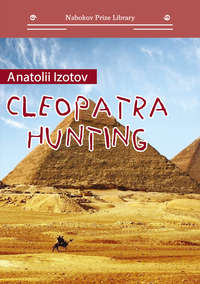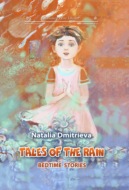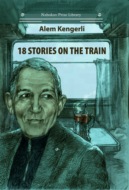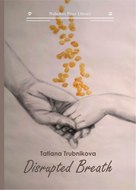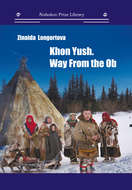Kitabı oku: «Cleopatra Hunting»
© Anatolii Izotov, 2019
© International Union of writers, 2019
* * *
I was born in the summer of 1940 in the Kaluga region, spent childhood and youth in the Crimea, in Bogatoye village (formerly Bakhchi-Eli), located halfway between Simferopol and Feodosia. After graduating from high school I worked in the Donbass for a year, and then entered the Novocherkassk Polytechnic Institute. After graduation, I received a diploma of an engineer-hydrogeologist and a job referral to work at the numbered plant. I spent ten years working at a uranium mining enterprise in the restricted area of Uch-Kuduk city. Then, already an experienced mining engineer, I was sent to the North Bohemia, on a business trip abroad, which ran over ten years. I defended my thesis on Czech-related affairs and then returned to my native land where I got hired at VIOGEM Institute (Belgorod), eventually becoming the chief engineer. As of now, I am the Institute’s scientific consultant.
I began writing poetry since I was fifteen and got my first publication in «Kadievka Worker» and «Industry Cadres» papers (1958–1964). One of the works of that period, the white verse «Letter from Central Asia» was then included in the «Letters from the Poplar Fluff Spring» book, published by the Rostov Publishing House in 1967.
I have been writing prose since 1965. For a long time, I could not publish my early stories – the short novel «Cleopatra Hunting», «Farhad» and «To those who are in the field» and others, due to a specific nature of my work at a restricted access facility. From 2005 to 2010, I published four books in limited editions – a collection of poems, a collection of short stories and two novels.
I am actively involved in literary research, my most prized studies being the analysis of the creative legacy of M.Yu. Lermontov and Homer.
I am an (associate) member of the International Writers Association since 2015.
In this status, I enjoy regular publications in «Russian Bell Almanac» magazine, and I already took part in the literary contests held under the aegis of IWA – Yalos 2016, Yalos 2017. I also participated in the XXXIV science fiction convention «AELITA», Jules Verne prose contests, Innokentiy Annensky poetry contests and others. I was awarded diplomas of various degrees, including «For Major Contribution to the Development of Culture», the Grand Prix Diploma for Best Publicism-2017, the Laureate Diploma of the 2nd degree of the «Russian Literary Prize» by the «Russian Bell» magazine and the medal «For Major Contribution to the National Literature».
I published two books: the paper novel «Verka» and the audiobook «Stories».
Maya had blue eyes like chicory petals in the morning, with wide, bottomless pupils – their thick, smoky blueness mesmerized and beckoned like gentle summer sea. She might seem lanky due to her rather high stature and deep clavicular dimples. However, her slender legs, ample breasts, and beautiful posture gave her figure a special softness and femininity.
Every morning, Maya sat in front of the mirror for hours, carefully arranging her blond hair into a magnificent, intricate coif; then, with elegant movements of an artist she put shadows on her eyelids, painted her eyes and lips, and then passed on to clothes. Only after discovering the complete correspondence of her appearance to some unknown ideal, she would get out to the street. Even on her way to the medical station where Maya had been working as a nurse for four years now, she did not miss an opportunity to quickly check her full reflection in wide shop windows of the beauty salon, the music school and the furniture store, just in order to finally convince herself of the flawlessness of her figure. Then she went out onto the main road connecting the city center with the newly constructed buildings. Here, Maya would stop, making way first for the security officers with machine guns behind their shoulders and dogs on leashes, then for the escorts with machine guns tilted forward, and, finally, for a long convoy of prisoners.
The cons were escorted from the prison camp to a construction site, surrounded by barbed wire, where soldiers were already occupying their positions on watchtowers, and the officers were fussing about at the checkpoint. The men in the convoy all looked the same: dark-skinned, with their hands behind their backs, wearing heavy boots that raised clouds of reddish dust on the roadside. The cons were marching in silence, ready to obey the convoy’s command at any moment: to stop, raise their hands up, sit down or even lie down, which Maya could see for herself when a drunken pothead, who broke the ranks, was shot right before her very eyes. At the sight of a young woman, the prisoners began imitating racy, luscious kisses that merged into one piercing siren of unsatisfied love. Maya was not at all scared, and these sounds did not confuse her. On the contrary, she was amused: she tried to imagine what prisoners would do if they had a young, beautiful woman among themselves.
Maya always came to work long before the impatient people began gathering at the office – to prepare her tools and her workplace, and to set herself up for seeing patients. Maya worked swiftly, her hands were delicate and dexterous, and her soul was kind. Making injections, she always picked up the best moment for giving a shot so that a person would not feel pain and fear. She would joke with cheerful patients, find the words of consolation and faith for the gravely ill, and, she gave her best to inspire optimism in hopeless ones. She accepted their thanks with reserve, but every time a warm wave of joy would rise in her soul as she realized that her work was not in vain, and her efforts were wanted and sought after. At such moments her work seemed to be the highest and most celebratory moment of her life.
Maya willingly agreed to work overtime: she was dreadfully short of money. Almost all her earnings went to everyday expenses, and the scanty savings by no means made her dreams of escaping the burning desert and settling in the Moscow suburbs more feasible. There, Maya was promised a good job and a room in the hostel for the initial period, but she dreamed of her own apartment, that, by her humble standards, costs an arm and a leg. On top of that, Maya wanted to get good furniture and utensils. One could easily buy all of this in local shops. As things stood at the time, at least two skills were required in order for her to be able to put some money aside: to earn good money and to lead a wary life. As for the work, Maya spared no effort: she accepted paid night watches and worked on holidays, administered injections, performed domiciliary medical procedures, stepped in for other nurses. As for saving money, though, it was both difficult and humiliating for her generous soul. Maya almost did not know how to say no when she was asked for a loan, although she tried to learn how to do it because some wise guy would always try to avoid returning the debts. She participated in all charity activities and parties, made generous gifts, loved fashionable and beautiful dresses, used expensive cosmetics, bought jewelry, books, and trinkets, and went to the seaside every year. At the same time, she did not keep good track of what she was supposed to get for her overtime work, and she hated visiting the odious accounting department, where they would often «forget» to include the extra payrolls.
Maya had an unbridled imagination that took her away from reality. She loved poetry, read a lot and listened to poems with great pleasure, having even performed several times with solo readings of poems by Akhmatova and Yesenin at school evenings. Her favorite, though, was the wonderful poem «Egyptian Nights» by Valery Bryusov, which she knew by heart, and could read it time and time again, especially in moments of daydreaming.
In her fairy-tale dreams, the young girl would often see herself as a movie star, living a Western life, abundant and luxurious, or as a millionaire, traveling around the noisy capitals of wealthy countries, or even as Cleopatra, being generous with her admirers. Allowing her mind to fly away to the ancient Egypt, Maya imagined herself arranging luxurious parties in her palace, traveling on her sailboat along the Mediterranean Sea and the Blue Nile, switching her transparent, golden and diamond-studded dresses, drinking foreign wines, accompanied by delicious foods – just like a poem would have it…
The beautiful and carefree feast
Is staged in the gardens of the Egyptian queen,
It seems as if the whole vast world
Fit into its narrow borders.
Next to the square pond
Piqued with the Memphis gold,
At the opulently set table
The pleasure circle was made ready.
On the ivory beds,
The crowned guests are lying,
Dozens of bronze lamps
Are emanating crimson light day all around;
The fans are waving silently,
Sweetly giving away the freshness,
And young boys are stealing by, pouring
The wine into crystal phials…
The music is sensually moaning…
..After reading this poem, Maya gradually returned to the real world – but even there, a small town near Moscow would suddenly arise in her mind, with a cozy apartment, a quiet river nearby and clean pine woods all around… Maya never dreamed of family and motherhood: just like the Egyptian queen, she wanted to always be free in choosing her lovers, while a crowd of admirers was there to amuse her and tickle her vanity. We have to give it to her: the girl never felt the lack of attention of the stronger sex, although the men she met did not bring much happiness and joy into her life, for, just like Cleopatra, she longed for a passionate and exalted love, while her suitors did not match her imagination.
Recently, one guy, in particular, was most successful in gaining Maya’s favor – Lev Klyuchitsky – the head of a construction site. They met about three months ago at a party organized on some insignificant occasion by a handsome radiologist with good connections in business circles of the city. Klyuchitsky immediately attracted her attention with his elegant appearance and subtle request to get him a couple of dozen syringes for insane amounts of money. He finally won her over, though, when he showed his appreciation by giving her the appointed amount of money together with an elegant cognac set made of Czech glass. Then he repeatedly took Maya to the only restaurant in their town, named after one of the European cities. However, quickly getting fed up with their specialties and signature drinks, he hinted that they could have a much better party at her house. Maya did not say anything, and Klyuchitsky began to present her with gifts that were necessary both for her future and current apartment as if preparing Maya’s place for the time when he would occupy his rightful place there.
One evening, a dropside UAZ drove over to Maya’s place and the apple-cheeked driver brought in some boxes, bundles and other parts of a customized kitchen set to her modest apartment. The driver installed a shiny sink, hung and stowed some cabinets, adjusted the drawers and disappeared with an expression of deep satisfaction on his face. The kitchen that was empty up to that moment became radiant with crisp white enamel, suddenly turning into a cooking laboratory of some kind…
Three days later, another driver – a construction battalion soldier – brought in a huge carpet into the room with a similar smiling and shining face on him, and Maya was amazed at its size and beauty, as well as the excellent quality. Having spread the gift along the plain plank floor, Maya just stood there, contemplating the autumn landscape stitched on a deep blue background for a long while, as well as the incredibly convincing maple leaves, blades of withered grass, crimson forest and black water. After that, she gently stroked the springy surface of the carpet with her palm, treaded upon it with her bare feet, pleasantly drowning in soft thick wool. With sadness, anxiety, and hope, Maya realized that there was a different life just a short distance away, the total opposite of hers: rich and beautiful, and, maybe just like the one from her dreams.
Klyuchitsky took his time with the announced party and did not insist much, but the events unfolded in such a way that Maya herself had to invite him to visit. At the beginning of summer, she received a telegram saying that her mother was on the verge of death, so she was forced to urgently come back to her native village, lost in the middle of nowhere. Upon learning of the grievous event, Klyuchitsky in no time got her a ticket to Moscow with a transfer in Tashkent. Were it not for him, she would have to bump along on the train for many days, exhausted from the inconveniences and doubts: will she arrive in time? And on the day of departure, he sent her a car, which took Maya directly to the airfield. Two weeks later, when she returned from the funeral, Klyuchitsky met her at the Tashkent airport, which was quite unexpected for her, and booked her a single room in the Dustlik hotel. In the evening, he brought a luxurious dinner to her apartment, then disappeared and returned only early in the morning to accompany her to their plane. Maya calmly and happily slept in a cool hotel room and met her guardian angel in the best of spirits. They arrived at the airport by taxi and a couple of hours later they were at home.
From all this, Maya concluded that Klyuchitsky’s business ties went far beyond the limits of their town, and this further improved her suitor’s image in her eyes – she saw him more as a patron, rather than an admirer, although one who was always ready to help out, to lend a hand and to bless her with gifts. Still, the attention of a handsome man and Klyuchitsky was undoubtedly handsome, fed her vanity and, furthermore, she felt that with his help she would be able to get the key to making her cherished dream come true at last. But Maya also understood that fair’s fair, and therefore on the day of her homecoming she invited Klyuchitsky to come to her place next Saturday since her flatmate – the surgical nurse – would be starting her night shift then. Generally speaking, her flatmate was not a hindrance, as they lived in a two-room section, and both had a separate room with a separate entrance, but postponing Klyuchitsky’s much-anticipated rendezvous was also a tribute to her coquetry and the age-old love game that Maya played with all her wooers.
On Friday, when Maya decided to do a spring cleaning in her apartment, a sandstorm began and the town got enveloped in a thick raging shroud of sand and dust. Maya was always both frightened and at the same time exulted by the riotous winds, which, for an instant, succeeded in tempering the heat – the key bane of the desert.
* * *
The heat season in the Kyzyl-Kum desert begins in May and lasts until the end of August. Spring here is short, bright and fast-paced. In April, the sun shines soothingly, and the gray steppe instantly comes to life, its tens of kilometers getting overgrown with light green umbrellas of ferrule, growing to a half-meter plants in a matter of a few days. Curly crowns of separate plants are spaced several meters apart, as if planted on a unique planting grid by a skilled gardener, providing each root with its own patch of moistened reddish-yellow sand. Therefore, the plain, covered with a ferrule, becomes a patchy yellowish-green carpet, resembling a giant leopard skin. The specific smell of the ferrule attracts clouds of insects: flies, bugs, midges, spiders and all sorts of strange small creatures that cling to fleshy stalks and swarm up and down the firm branches.
The sand in this time of year is fresh, nice to look at and to touch; it seems life-giving and fertile. Indeed, if you look closely at its surface, you can see the tiny little needles of grass and even tinier, smaller than a millet grain, white and blue flowers, piercing through the reddish soil moved by an unknown, miraculous force.
The ravines are especially spectacular at this time, especially in those places where the narrow hollow-ways join them back to back. Here, they seem to escape the wrinkled mountains right into the flat plain and turn into the wide channels of mythical creeks and streams, with bottoms strewn with coarse sand and gravel, their oval banks covered with spongy loess. On this soft, dry soil, the tiny flowers are growing densely, forming conglomerations of fanciful pink, green and white patterns, resembling flower beds in the parks of southern cities, those embellished with dates and slogans. Vibrant green islands of plant life can be seen on the pink rocks of the granite massif, towering above the plain. Its ancient stones are already stricken by a mesh of cracks, formed under the influence of tectonic processes and weathering; in the course of the winter, they’ve accumulated the scant moisture, and the grass found it, sending down its clingy roots and fibers into the granite.
On the plain, on the slopes of the hills and in the hollows you can come across small clearings of orange tulips: they are smaller than the garden variety, but they are pretty to look at, too. There are also white mushrooms in the desert, their stout hats ungainly spreading along the infirm sand as if someone scattered pieces of melted cheese with the careless hand, and now it dries and cracks under the rays of the scorching sun. People say that five years ago the tulips covered the desert in a thick carpet in the spring, and the mushrooms were there in spades. It is easy to believe that, because even in the first year of her stay here, Maya found both mushrooms and tulips in the neighborhood, when she wandered alone through the strange, never-before-seen lands. Now, urban folks have to drive tens of kilometers out of the city to get mushrooms and flowers.
In April, the air is clear, the sun does not burn yet, and the desert tan is every bit as good as the seaside one. For Maya, every April weekend was a holiday. With a book and a little cold water in a thermos, she went to the mountains and there, hiding out in some dead gorge, she would strip naked and bathe in the gentle sunlight. Within two or three days, her skin acquired a pleasant golden-bronze color, much to everyone’s surprise during her future holidays at the seaside.
Once, when she was sunbathing on a small plateau near the watershed, Maya discovered a way to feel the infinity of the universe. In order to attain that feel, she had to lie on top of the mountain so as to see the sky everywhere: not only above, but also from the sides and under her body, and imagine that the Earth is just a small ball, and she lies on it and covers up most of it with her back. And then she would start to feel her body hovering in the real emptiness, surrounding her from all sides, with neither top, nor bottom, nor end, nor edge. And this space is not imaginary, no, it is right here, by her side! Infinity begins already where the flat surface of the warm granite ends, she could feel it there, she could feel it below, under her body, and everywhere else – on the left, on the right and at the center; bang! And you are floating effortlessly and flying into the azure abyss…
In spring, the most numerous, and, perhaps, the dominant inhabitants of the desert come to life – the turtles. In Maya’s opinion, these did not dwindle in numbers in the last few years. In April, the turtles can be found everywhere. They are crawling slowly through the sand, rolling over its thin ripples, dropping into building pits, falling under the wheels and caterpillars of passing cars, but, nevertheless, keep moving steadily towards their favorite pastures. There are huge turtles, of the size of an entire telephone set, with a roughened thick shell and deep black and yellow patterns pressed into it as though made with a powerful pressing engine. Their paws are thick and strong, with a comb of blunt, blue claws. This large reptile is very catious: at the sight of humans, it quickly hides its head and paws in its shell, keeping them inside even when being turned on its back, which is the most uncomfortable position for a turtle. These giants usually become the prey of connoisseurs of pilaf and turtle soup.
There is, however, a rarer, smaller variety of turtles with a soft bluish shell. Like all kids, they are very energetic and careless, and never hide their heads after falling into human hands. Children capture them, bring them home to play, walk with them, feed them grass and green onions. But, in the end, a turtle held in captivity dies.
The medium-sized turtles – the most common ones – are used in the production of ashtrays – the exotic souvenirs of the desert. Maya was not keen of their look: the imprint of a spinal column on the inner side of their shell made her cringe and immediately recall the barbaric way of killing animals: once she saw an electric welder familiar to her plucking bloodied flesh that was still alive out of the corneous carapace with a steel electrode…
The abundance of turtles soon becomes habitual: they cease to catch the eye and stop to be seen as living creatures. The shell of the desert tortoise is not strong enough: it cannot even withstand the weight of a car, bursting, exploding with blue intestines, quickly drying out and dissipating under the hot air and sand, while shell fragments turn white and lay there under the scorching sun for a long time, without causing neither irritation, nor regret. The turtles are getting killed not only by fans of their sweet meat and lovers of patterned ashtrays but also by anybody and everybody, who do it just for fun, because the animals are mute, because they can be kicked, whacked with a stone or dropped on asphalt, thrown into the water (now, let’s see if they can swim!), put on hot coals (will they manage to get out in time?) No one protects turtles and no one stands up for them, as though they are complete outsiders in this desert…
By the end of April, the air becomes unbearably hot, as the plants quickly wilt, dry up and become scarce. Here and there, you can only see smooth, as if polished by the glass-dust, stalks of dried ferrule, that stand up like white bones covered with sand dust. The turtles also disappear: they burrow into the sand and sleep until the next spring. The active life of turtles lasts for ten to twelve days a year. For such a short period of time, people never get a chance to wipe them out, so, all the cruelty of civilization notwithstanding, most of these reptiles manage to lay eggs, stock up calories and fall into a long hibernation, in order to appear a year later and once again indulge in plowing the hot sand with their clumsy paws.
The desert fades and becomes hotter and hotter. In May, the sun-warmed land no longer has time to cool down overnight. It becomes infernally hot: somewhere between forty and forty-five degrees Celsius in the shade every day.
Hot, hot, hot! The breeze does not refresh, it just comes in heat waves, each one of them hotter than the one preceding it. Sometimes, it seems that the heart would fail under this infinite heat buildup and break out of the chest cage. The nerves get frayed; the body gets soft and flabby. Sweat pours in buckets – the face, neck, and back are constantly wet… The handled objects quickly become wet and slippery. Salty sweat makes scratches sting, tickles the swollen eyelids, and corrodes the metal in areas where it is most often touched by the naked hand. The iron gets hot and sears the skin the same way it would burn in the biting frost. The skin pores get wide open, like windows, and you constantly feel them exude the excess heat, removing it from the body. If you decide to take a cool bath, then you’d better stay there as long as possible, because, until the moment you sweat again in the open air, you will suffer from internal stuffiness, the terrible pressure growing in every cell, bursting from within, like a premonition of a heat stroke. Sometimes you cannot stand it and just start running round in circles, not knowing where to hide or find shelter from this endless heat.
The sky is frightening: it is dominated by blazing, dazzling whitish tones. The Sun is getting closer to the Earth, filling up the sky above with a fiery mass, burning and burning relentlessly, uncontrollably and unrestrainedly. The stones, sand, and concrete – everything gets hot, and you cannot figure out where this tormenting heat comes from.
Mellow, half-asleep people are working according to a schedule made to last by the authorities of the country, without any regard to the heat. They stare bluntly at the production processes and resolve other issues, pull the levers of excavators, steer heavy cars and drink, drink, drink… The most experienced ones prefer hot green tea, others drink black one, the amateurs and women drink iced water, while those with no means of making drinks stand in the lines for a mug of kvass. And everyone is counting the moments until the evening, the time when the scorching sun above disappears and they can finally come out into the streets, breathing again.
In the evenings, the asphalt and the buildings continue to radiate sweltering, unbearable heat. At night, no one can sleep: it gets too hot to breathe, to lie, you feel thirsty, but if you drink something, you start bursting with excess moisture, pouring sweat. The bed gets wet, everything sticks and it is impossible to fall asleep even in the early morning. Then the new day begins, and with it, a new round of the useless struggle with the heat.
The work is distracting, but body accumulates the internal tension and fatigue from insomnia. Everything becomes annoying. And only a strong wind that will come without failing and carries a cloud of sand and dust, can tame the heat for a little while and bring a short relief.
The winds are different in the desert, and they are blowing constantly. Even on a quiet, scorching day, when the air is viscous, like hot treacle, and motionless, and it seems that all living and non-living things fall into a lazy trance, every now and then a little mischievous gust of wind comes seemingly from nowhere.
It dances like a madman, squirms, jumps, and rushes everywhere, snatches small objects from hands, overturns everything that is unstable, splashes sand, laughs in your face, whistles, puffs, and zigzags away.
Often, larger whirlwinds – the sandstorms – come rushing along the streets. They move with certainty and are noticeable from anywhere in the city. Their prey is paper, pieces of plywood, fragments of foam, hanged or abandoned clothes. All of this gets sucked in a huge spinning whirl, rises rapidly up its narrow neck and is thrown high into the sky. The most striking are the rectangular paper sheets that swirl over houses, like a flock of hysterical ravens.
The winds, like street sweepers, eliminate garbage from the streets and spread it across a large area, so that even far outside the city you can see the scraps of some official papers in the sand, sheets torn from the school notebooks, letters and mailing box lids with the addresses of various cities and villages.
To be in the chaos of a raging sandstorm is unpleasant and terrifying: the whirlwind, like a devil, plays with a man in mean ways, painfully lashes with biting sandblasts from the sides, from above, from below, at random, relentlessly tortures your clothes and stuns you with loud hisses, squeaks, and squeals. The moments spent in the embrace of a whirlwind seem excruciatingly long, and the feel of being short of breath increases the fear.
Several times a year the desert gets shaken by storms. Their approach can be seen from afar: usually from the north, across the horizon, a towering black wall starts approaching the city, gets inevitably nearer and nearer, absorbing everything in its path. A tense silence reigns upon its path and you can clearly see the hundreds of small, protruding tornados «marching» in dense rows. Like a row of Roman legionaries, escaping from underground, they are striding confidently, without a fuss, united by one goal: to raise into the air and destroy houses built by man. And yet the hurricane hits the city unexpectedly, immediately trying to lift it into the air. In the beginning, you can hear the slamming of doors and the ringing of broken glass, then the rattle of roofs, the banging of broken slate, the whistling of wires and balcony grades, joined by the deep groans of houses, and finally, everything merges into a hellish roar and continuous rumble. The day gets replaced by twilight, which turns into night. The hurricane rages for hours, sometimes for days.
No matter how well the windows and doors are caulked and plugged, in the middle of the hurricane storm, the wind still discovers all the cracks and searches every part of the house up and down, filling it with the fine-grained sand. The sand gets everywhere: a dense sand veil hangs in the air, it lies in even layers on the floor, on furniture, on faces of sleeping people and covers the souls of those who are awake. Especially disgusting snowstorms come in winter, bringing with them the cold that invades houses and takes residence, reigning over people, despite the powerful heating. Every apartment at this time gets dirty, dusty and uncomfortable. When the storm subsides, there comes a short period of stunning purity and calmness in the air. And this is not a deceptive perception caused by the contrast between the lingering noise and the long-hoped-for silence – not at all, the eye is pleased with the high dark blue sky, the colorful horizon with the predominance of yellowish tones up close and the violet ones in the distance, and with the transparent air, electrified by the already fading lighting strokes. Unfortunately, the sky soon becomes opaque, the horizon gets gray, and the tornadoes rise up in the air again, with moving clouds of dust that bite your nose. The desert returns into its usual state.
Ücretsiz ön izlemeyi tamamladınız.
